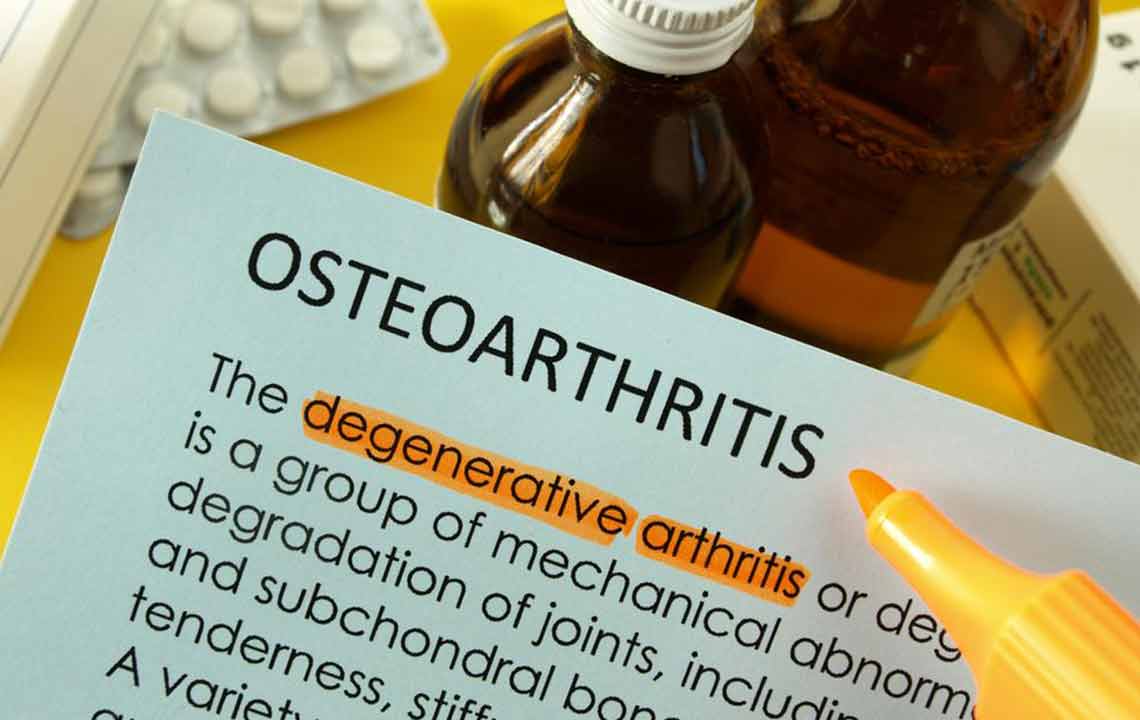Osteoarthritis: Causes, symptoms, and treatments
What is osteoarthritis of the knee?
Knee osteoarthritis, also known as degenerative arthritis, is a common form of arthritis in which the surface layer of cartilage wears away. This allows rubbing together of bones under the cartilage which results in swelling, stiffness, and pain in knee joint.
Osteoarthritis of the knee can also occur in young people, but the older aged people are more vulnerable. Heredity also plays a role in it.

Possible causes
- Aging : The possibility of knee osteoarthritis is more in adults, especially after the age of 55 years. It is so because with older age, the cartilage becomes weak and less flexible, and the knee joints experience wear and tear.
- Gender : Women are more prone to develop osteoarthritis in the knee as compared to men.
- Heredity : The possibility of a person developing knee osteoarthritis is also influenced by genetics. It may also be due to inherited abnormalities in the shape of bones surrounding knee joint.
- Obesity : Body weight of a person is mostly supported by the knee and more weight increases pressure on the knee joints. Thus, an obese person is more likely to develop osteoarthritis. For instance, about 2 out of 3 obese people are prone to osteoarthritis.
Signs and symptoms
- Pain : Pain is the most common symptom of knee osteoarthritis, which increases during activities involving the movement of the joint, such as bending down or climbing up stairs. It usually gets relieved during rest.
- Stiffness : Stiffness of knee is due to friction in the bones and swelling of joint. It results in a limited range of motion of the knee, and the person may even find it difficult to straighten the knee. Stiffness is generally observed in the morning or after sitting for a long period.
- Swelling : Swelling of the knee is observed due to the rubbing of bones in the arthritic joint. It is accompanied by irritation and reddening of the knee and is sometimes warm to touch.
- Crepitus : Crepitus is the crackling or popping sound produced during movement of the knee. This is caused due to friction between bone and cartilage. It indicates that cartilage has worn away and bones are not being protected from friction.
- Medical history : The doctor will enquire about the patient’s medical history and ask if any family member suffers or had suffered from osteoarthritis. The doctor will discuss the symptoms of the pain or swell in the knee. The patient will also be asked when the pain worsens or reduces.
- Physical examination : Physical examination of the patient’s knee will be carried out to detect any signs of pain, swelling, stiffness and restricted motion of the knee.
- X-rays : X-rays can detect bone and cartilage damage indicating loss of cartilage in the knee. It can also show bone spurs indicating extra bone growth to compensate for cartilage loss. However, X-rays do not explain joint pain or joint tissue damage.
- MRI : Magnetic Resonance Imaging (MRI) scan is recommended if the X-rays results are not satisfactory. This test gives more detailed images of soft tissue (muscles, tendons, and ligaments) along with bones. MRI scan reports give more clarity to the doctor to diagnose if the symptoms are of osteoarthritis or due to damage of soft tissue.
Treatment for osteoarthritis of the knee
1. Home treatments
- Ideal body weight : Maintaining a healthy body weight and losing a small amount of weight (if necessary) will reduce the unnecessary stress on the knee joint.
- Exercise : Doing exercise regularly will strengthen muscles around the knee and will make it less prone to further cartilage loss. A stretching exercise program will help to keep the knee joint flexible and mobile.
- Warm or cold compress : Applying a warming pad or ice pack on the affected area for few minutes after any activity can provide temporary relief from swelling and pain.
2. Non-surgical treatments
- Medications : Over-the-counter medications such as pain relievers (e.g.: acetaminophen) and anti-inflammatory drugs (e.g.: aspirin) can be used to alleviate the symptoms of knee osteoarthritis and give some relief from pain.
- Injections : Steroid injections and hyaluronic acid injections are used to treat knee osteoarthritis. Steroid injections help to reduce swelling and thereby reduce knee stiffness and pain. Hyaluronic injections act as a lubricant for the knee joint.
- Supportive devices : Supportive braces are used either to provide support to the entire knee or to take the weight away from arthritis affected knee.
3. Surgical treatment
- Arthroscopy : This procedure involves the use of a small telescope (arthroscope) to see the joint space. Then, the surgeon can remove damaged cartilage, clean bone surface, and repair other damaged tissues.
- Arthroplasty : It is a surgical procedure in which joints are replaced with artificial parts made of plastic or metal. The replacement surgery is carried out either on one side of the knee or the entire knee.
- Osteotomy : The objective of this procedure involves incision or cutting of bone in order to enhance the knee alignment.
The aforementioned treatments are beneficial, however, you must always consult a doctor first before undergoing any treatment for osteoarthritis of the knee.


